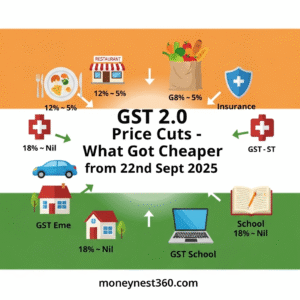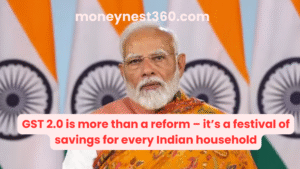We all dream of giving our family a happy and secure life. But what if something unexpected happens to the main earning member? That’s where a Term Insurance Plan comes in.
Many people delay buying insurance because they think it’s “too early” — but in reality, the right age to buy a term plan is as soon as you start earning. Let’s understand why.
What is a Term Insurance Plan?
A Term Plan is the simplest and most affordable form of life insurance.
- You pay a premium (monthly/annual).
- You get covered for a fixed period (called policy tenure).
- If the policyholder passes away during this tenure, the nominee (family) gets a lump sum amount (sum assured).

Example: If you buy a ₹1 crore term plan at age 25 for 30 years, and something happens to you at age 40, your family will receive the full ₹1 crore.
Important:
If you survive the policy tenure, there is no maturity benefit in a pure term plan.
If you survive the policy tenure in a Term-cum-Wealth Plan, you will receive maturity benefits
Also Read: Are You Looking For Best Savings Plan?
How Are Premiums Decided in Term Plans?
Term insurance is one of the most affordable ways to secure your family’s financial future. But the premium you pay depends on several personal and policy-related factors. Here’s a detailed breakdown:
1. Age
- Younger = Cheaper Premiums
When you buy early, the risk of death is considered lower. Hence, insurers charge lower premiums. - If you delay buying, premiums increase sharply as you age.
Example:
- A 25-year-old may pay ₹600–₹800/month for a ₹1 crore cover.
- A 40-year-old may pay ₹1,500–₹2,000/month for the same cover.
2. Gender
- Women generally pay lower premiums than men.
- This is because statistically, women live longer than men, making them less risky for insurers.
Example:
- A 30-year-old non-smoker man may pay ₹1,000/month for ₹1 crore cover.
- A woman of the same profile might pay only around ₹850/month.
3. Sum Assured (Coverage Amount)
- The higher the cover you choose, the higher the premium.
- However, the rate per lakh of coverage reduces as you increase cover — insurers often give discounts for higher sum assured.
Example:
- ₹50 lakh cover may cost ₹600/month.
- ₹1 crore cover may cost ₹900/month (not double, because of slab discounts).

4. Lifestyle Habits
- Smoking, drinking, or tobacco consumption leads to higher premiums.
- This is because such habits increase health risks and reduce life expectancy.
Example:
- A 30-year-old non-smoker may pay ₹900/month for ₹1 crore cover.
- A smoker of the same age may pay ₹1,700–₹1,900/month.
5. Policy Term (Duration of Coverage)
- The longer the coverage period, the higher the premium.
- This is because the insurer covers you for more years, which increases risk.
Example:
- A 30-year-old buying a 20-year term may pay ₹800/month.
- For a 40-year term, the premium may rise to ₹1,200/month.
6. Medical History & Health Condition
- If you have pre-existing conditions (like diabetes, hypertension, or heart problems), premiums are higher.
- Some insurers may even reject applications in case of serious illnesses.
Example:
- A healthy person may get ₹1 crore cover for ₹900/month.
- Someone with controlled diabetes may need to pay ₹1,300–₹1,500/month.
7. Occupation & Hobbies
- Risky jobs (mining, aviation, armed forces) or dangerous hobbies (skydiving, racing) can lead to higher premiums or extra loading.
When Should You Buy a Term Plan?
The simplest answer is: the earlier, the better — ideally as soon as you start earning.
Here’s why:
1. Eligibility Window
- Most insurers allow you to buy term insurance between 18 to 65 years of age.
- However, waiting until your 40s or 50s means premiums become much higher, and medical tests may reveal health issues that increase cost or reduce eligibility.
2. Low Premium Advantage
- Buying young locks in low premiums for the entire policy term.
- Insurers calculate premiums based on your entry age — once fixed, it doesn’t increase every year.
Example:
- A 25-year-old pays around ₹600–₹800/month for ₹1 crore cover.
- A 40-year-old for the same cover pays ₹1,500–₹2,000/month.
- Over 30 years, the younger buyer saves lakhs of rupees
3. Higher Coverage at Lower Cost
- Young and healthy individuals are considered low-risk by insurers.
- They are more likely to get higher coverage approved without medical complications, compared to someone older with lifestyle diseases.
4. Best for Early Responsibilities
- In your 20s or early 30s, you may be supporting parents, planning marriage, or taking loans.
- A term plan ensures that, in case of your absence, your family’s financial security is never compromised.
5. Most Affordable Protection Tool
- Compared to other insurance products, term plans are pure protection and therefore much cheaper.
- For the cost of one weekend dinner, you can safeguard your family’s future with a crore-plus cover.
Example Story – Ramesh’s Case:
Meet Ramesh, a 25-year-old who just started his career in IT.
He decides to buy a ₹1 crore term insurance plan for 30 years at a cost of just ₹700/month.
Ramesh’s Life Journey
- At 25 → Starts working, takes term plan early.
- At 35 → Gets married.
- At 40 → Blessed with two children.
- At 45 → Unfortunately, Ramesh passes away unexpectedly.
Financial Security for Family
Because Ramesh bought his policy early, his family immediately receives ₹1 crore.
They use it for:
- Children’s education
- Home loan repayment
- Daily household expenses
The financial burden is lifted, and his family can continue life without compromise
What If Ramesh Waited Till 40?
- His premium would have been 2–3 times higher (₹1,500–₹2,000/month).
- He might have faced medical tests or even policy rejection if health conditions had developed.
- His family’s protection would have been delayed during his most crucial years.
Lesson/Moral:
By buying a term plan early, Ramesh not only secured his family’s future but also saved lakhs in premiums.
Visit IRDAI for insurance Guidelines in india
Pure Term Plan v/s Term-cum-Wealth Plan
- Pure Term Plan → If you survive till the end of the policy tenure, no maturity benefit is paid. It only provides death benefit.
- Term-cum-Wealth (Term with Return of Premium / Term with Investment Benefit) → If you survive till the end of the policy tenure, you will get maturity benefit. This could be:
- Return of Premium (all premiums you paid during the term, excluding taxes/charges).
- Wealth Creation Benefit(ULIP Plans) (depending on the plan, part of your premium is invested in funds or savings, so you get a lump sum maturity value along with life cover).
Example:
- Pure Term: You pay ₹10,000/year for 20 years. If you survive, you get ₹0 back.
- Term-cum-Wealth: You pay ₹20,000/year for 20 years. If you survive, you may get back all premiums (₹4,00,000) or a higher maturity amount depending on the plan.
Pure Term Plan vs Term-cum-Wealth Plan
| Feature | Pure Term Plan | Term-cum-Wealth Plan (Return of Premium / Investment Benefit) |
|---|---|---|
| Primary Purpose | Pure protection (only death benefit) | Protection + Savings/Wealth creation |
| Maturity Benefit | ❌ No maturity benefit | ✅ Maturity benefit (Return of Premium or Wealth value) |
| Premium Amount | Lower premiums | Higher premiums |
| If Policyholder Survives | Gets nothing back | Gets back premiums paid or lump sum maturity value |
| If Policyholder Dies During Term | Nominee receives full Sum Assured | Nominee receives full Sum Assured (maturity benefit also depends on plan terms) |
| Best Suited For | People who want maximum cover at lowest cost | People who want protection + savings/wealth |
| Example | Pay ₹10,000/year for 20 years → If you survive, you get ₹0 | Pay ₹20,000/year for 20 years → If you survive, you may get ₹4,00,000 (return of premium) or more (if linked to wealth plan) |
In short:
- If you want maximum protection at lowest cost → Choose Pure Term Plan.
- If you want protection + some returns → Choose Term-cum-Wealth Plan
Benefits of Term Insurance in India
- Tax Benefits: Premiums up to ₹1.5 lakh under Sec 80C, and death benefit tax-free under Sec 10(10D).
- Loan Protection: Death benefit can repay home loans or personal loans.
- Stress-Free Life: Peace of mind knowing your family’s future is secure.
Conclusion
The best time to buy a term insurance plan is when you start your career — ideally in your 20s. You’ll enjoy low premiums, high coverage, and peace of mind.
Whether you choose a pure term plan or a term-cum-wealth plan, the important thing is to start early and protect your family’s future.
Don’t delay – buy smart, buy young!









1 thought on “Right Age to Buy a Term Insurance Plan in India?”